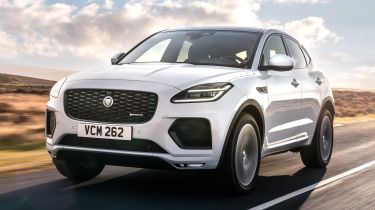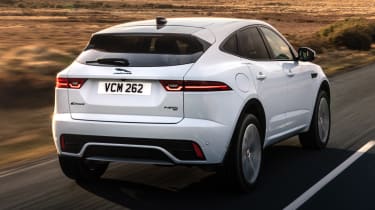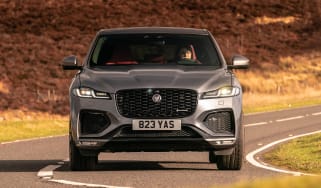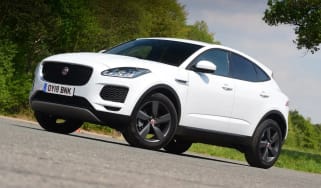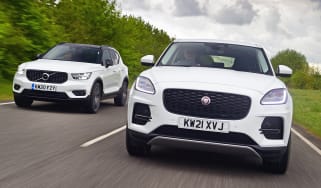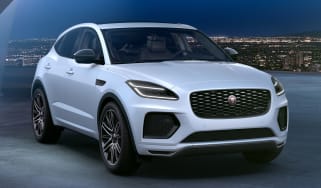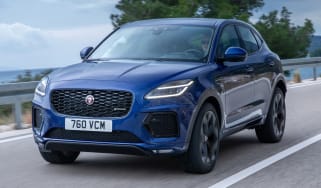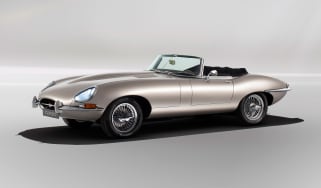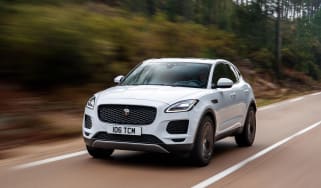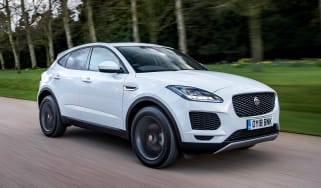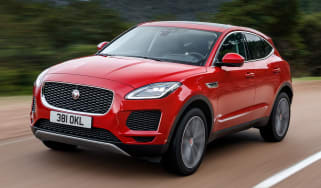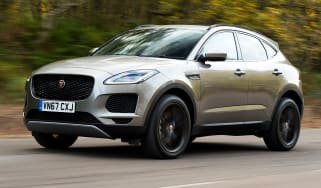Jaguar E-Pace review
The Jaguar E-Pace has its work cut out in the ultra-competitive small premium SUV market

If you’ve lusted after a Jaguar F-Pace but wanted its essence bottled-up in a smaller package, then the Jaguar E-Pace isn’t quite that car. It’s a competent member of the small premium SUV market, though, because it's decent enough to drive, smart enough to look at, and available in a variety of configurations.
Ultimately it fails to really stand out against some particularly strong rivals, in spite of a mid-life facelift bringing welcome improvements to driving feel, efficiency and the on-board infotainment set-up. Have a good long sit in one before you take the plunge, as the interior isn’t the most exciting place to be, while the car's running costs could be better.
About the Jaguar E-Pace
It’s highly unusual for a car to be switched to a new platform mid-way through it’s life, but that’s what JLR did for the E-Pace SUV back in 2020. It was a move that allowed the introduction of a new plug-in hybrid (PHEV) variant which offered more appeal to business customers, and also addressed criticisms of the previous model’s less than sparkling handling and lacklustre infotainment system.
The new E-Pace underpinnings are a version of the PTA platform shared with the latest versions of the Discovery Sport and Range Rover Evoque. They’re lighter and more advanced, but you can’t tell you’re looking at a new E-Pace by what’s lurking under the bodywork.
Used - available now

2022 Mazda
CX-5
30,012 milesManualPetrol2.0L
Cash £22,750
2022 Mazda
CX-30
31,614 milesAutomaticPetrol2.0L
Cash £19,995
2022 Peugeot
5008
15,273 milesAutomaticDiesel1.5L
Cash £22,965
2023 Ford
Focus
20,134 milesAutomaticPetrol1.0L
Cash £16,495To help with that, JLR has also provided the 2021 E-Pace with redesigned bumpers at both ends, plus new mesh grille, lights and wheel designs. The interior has been upgraded a little too, with a new drive selector, retrimmed instrument binnacle and a modified transmission tunnel for extra driver knee-room. More importantly, there’s a new 11.4-inch touchscreen with JLR’s Pivi operating system and the 12.3-inch digital instrument cluster has been updated too.
Small premium SUVs are having a bit of a boom at the moment, and the Jaguar E-Pace is in a prime spot to take sales. It's the smallest car for sale in the Jaguar SUV line-up (a range that didn't exist before 2015), and whether you want to pay the list price or lease one, the E-Pace is offered in a wide range of configurations to suit your budget.
But the E-Pace doesn't have the premium small SUV market to itself. There are a number of manufacturers that are fighting for market share in this lucrative sector. Chief among the E-Pace's rivals are the BMW X1 and X2 duo, plus the Audi Q3, Mercedes GLB and the excellent Volvo XC40. There's also the Lexus UX, plus in-house competition from the second-generation Range Rover Evoque.
In terms of design, the E-Pace is recognisably a Jaguar, but the designers haven't just created a shrunken F-Pace. The baby Jaguar SUV has its own distinctive proportions, with shorter front and rear overhangs, while the low roof line is said to be inspired by the F-Type coupe.
Inside, the dashboard layout is more familiar, with lots of existing Jaguar switchgear and materials used to create an upmarket ambience. The R-Dynamic styling pack is now standard for the E-Pace's three available trim levels: S, SE Black and HSE Black.
The E-Pace range includes a reduced choice of 2.0-litre petrol and diesel engines; the P200 is no longer available on the price list, leaving the P160 and P250 petrols, while the D165 has also been discontinued - meaning the D200 is the sole surviving oil burner in the lineup.
The new plug-in hybrid (PHEV) option is badged P300e, and it combines a 197bhp 1.5-litre three-cylinder engine with a 108bhp electric motor for a maximum combined power output of 305bhp.
Prices for the E-Pace start from around £42,000, while at the top of the range, the P300e R‑Dynamic HSE Black is more than £54,000.

